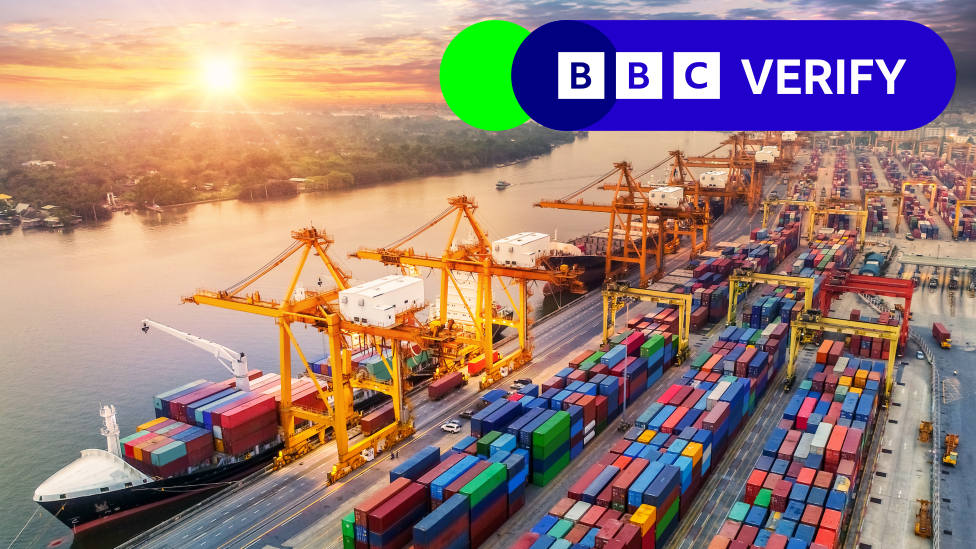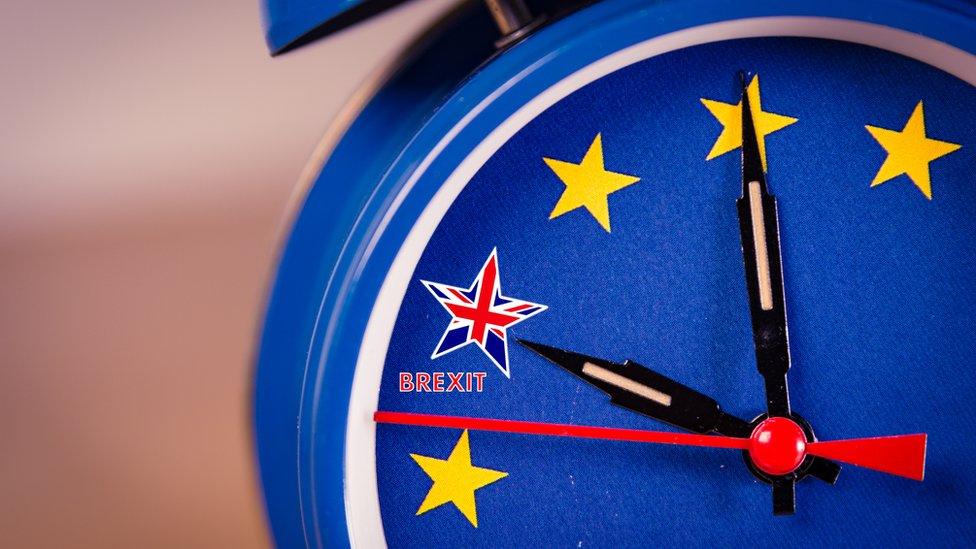Michael Gove: Brexit provisions to stay in Internal Market Bill
- Published
- comments
Michael Gove says the two sides would use “every second, every minute, every hour in order to reach agreement”.
Michael Gove has said parts of a bill which override provisions in the Brexit deal agreed with the EU would remain, despite EU requests to remove them.
The Cabinet Office minister said he is "committed" to reaching a deal on the UK's future relationship with the EU.
He met the European Commission's Maros Sefcovic to discuss the UK's future relationship with the EU on Monday.
Mr Sefcovic said the UK's negotiating position is still "far apart from what the EU can accept".
Formal trade talks resume on Tuesday.
Mr Gove said the talks on implementing the withdrawal agreement are at a "healthy stage".
But both sides say there is still disagreement over the UK's plan to override parts of the withdrawal agreement relating to Northern Ireland in a bill currently going through the House of Commons.
Speaking after his meeting with Mr Gove, Vice President Mr Sefcovic said there was a "window of opportunity" to come to an agreement on the Northern Ireland protocol, but added that was "rapidly closing".
The disagreement centres on the UK government's Internal Market Bill, which would override agreements made on the movement of goods between Great Britain and Northern Ireland. The agreement aimed to prevent a hard border between Northern Ireland and the Republic, which is still part of the EU.
Mr Sefcovic repeated the EU's request for the UK to remove the "contentious parts" of the bill by the end of September.
Maros Sefcovic says "much work remains to be done" to reach a trade deal with the UK.
He said the EU would "not be shy" in using "legal remedies" written into the withdrawal agreement to address any "violations".
But Mr Gove said the provisions on Northern Ireland would remain in the Internal Market Bill.
"There are those in European Union who have been concerned about clauses in Internal Market Bill but I was able to stress today these clauses are a safety net," he said.
He added: "We want to reach agreement in the joint committee, we want to make sure position of Northern Ireland is secure in UK, we want to make sure the withdrawal agreement is implemented in full. But those clauses are there, they are in legislation, supported by the House of Commons...and those clauses will remain in that bill."
The UK government has previously said it would "discharge its treaty obligations in good faith", but added that "it is important to remember the fundamental principle of parliamentary sovereignty".
The bill is set to be debated by MPs on Tuesday.
'Fundamental gaps'
The Brexit transition period, in which the UK has kept to EU trading rules, ends on 31 December. The UK and EU are yet to agree a deal that will govern their future trade.
Ahead of the resumption of trade talks, a UK government spokesperson said while this week represented the final formal round of negotiations, he expected discussions to continue up to a meeting of the EU Council, scheduled for 15 October.
He described the atmosphere as positive but added that "much was to be done".
Other long-running sticking points that could stymie negotiations include state aid and fishing access.
During this week's talks, negotiators will also discuss law enforcement and transport. The two chief negotiators - the EU's Mr Barnier and the UK's David Frost will meet on Friday morning.
BBC political correspondent Chris Mason said sources in government say that while progress is being made, there are "fundamental gaps" between the two sides and talk of "optimism" in recent days has been overstated.


Time is tight and there is no breakthrough... yet. A sentence you may just have heard before in these Brexit negotiations.
The chief negotiators on both sides - Lord Frost for the UK, Michel Barnier for the EU - will oversee this week's discussions, before meeting formally on Friday morning.
Whatever happens, a crunch point is rapidly approaching.
The deadline for a deal is two and a half weeks away.
Like lots of Brexit deadlines it could slip a bit... but not by much.

If the sides fail to reach a deal by the end of the year, the UK would trade with the EU on World Trade Organization (WTO) rules.
This would mean tariffs would be applied to most goods which UK businesses send to the EU, making UK goods more expensive and harder to sell in Europe.
The UK could also apply tariffs to EU goods.

What is the Internal Market Bill?
The bill sets out rules for the operation of the UK internal market - trade between England, Scotland, Wales and Northern Ireland - after the end of the Brexit transition period in January.
It proposes:
No new checks on goods moving from Northern Ireland to the rest of Great Britain
Giving UK ministers powers to modify or "disapply" rules relating to the movement of goods that will come into force from 1 January if the UK and EU are unable to reach an alternative agreement through a trade deal
Powers to override previously agreed obligations on state aid - government support for businesses.
- Published25 September 2020
- Published26 January 2024

- Published1 July 2020
